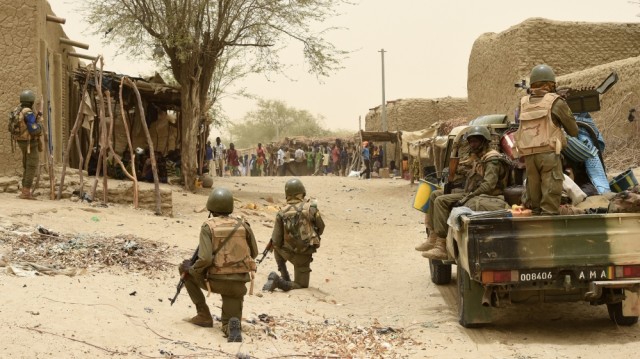
An alleged al-Qaeda-linked leader has been handed over to the International Criminal Court (ICC) to face charges of aiding the destruction of Mali’s city of Timbuktu, in the first such case before the tribunal.
Ahmad Al Faqi Al Mahdi was detained under an arrest warrant issued by the ICC last week and handed over by the authorities in Niger, the court said in a statement on Saturday.
The details of his arrest were not immediately clear.
Faqi is suspected “of war crimes allegedly committed in Timbuktu, Mali, between about 30 June 2012 and 10 July 2012, through intentionally directing attacks against buildings dedicated to religion and/or historical monuments,” the statement said.
Faqi arrived on Saturday in The Hague, where the ICC is based, in what is the first such case to be brought by the court for the destruction of religious buildings and historical monuments.
It is also the first case to be brought by the ICC – the world’s only permanent war crimes court – for the unrest that has wracked the west African nation of Mali.
Faqi, a Tuareg leader also known Abu Tourab, is suspected of war crimes for deliberately destroying buildings at the UNESCO-listed desert heritage site in 2012.
Called the “City of 333 Saints”, Timbuktu around 1,000km northeast of Mali’s capital Bamako, was attacked for months by jihadists.
In June 2012, al-Qaeda-linked fighters destroyed 16 of the northern city’s mausoleums, dating back to its golden age as an economic, intellectual and spiritual centre in the 15th and 16th centuries.
Faqi was a leader of Ansar Dine, a mainly Tuareg group linked to Al-Qaeda in the Islamic Maghreb (AQIM) and one of the groups that briefly took control of Mali’s vast arid north in 2012.
Born in Agoune, 100km west of Timbuktu, Faqi “was an active personality in the context of the occupation of Timbuktu,” the ICC said in a statement.
RELATED: Timbuktu: Was Islam taken hostage?
In his role as part of the Islamic Court of Timbuktu, Faqi is alleged to have jointly ordered or carried out the destruction of nine of the mausoleums as well as the Sidi Yahia Mosque.
The ICC said there were reasonable grounds to suspect that Faqi was “criminally responsible for having committed, individually and jointly with others, facilitated or otherwise contributed to the commission of war crimes” linked to the destruction of the buildings.
The ICC chief prosecutor Fatou Bensouda had opened an investigation into the situation in Mali in January 2013, after it was reported to the tribunal by the government of Mali the previous year.
In 2014 the UN cultural body, UNESCO, began rebuilding Timbuktu with the Malian government and other international organisations after a 2013 French-led military operation drove the armed groups out of the city.
The $11 million reconstruction project relies heavily on traditional building methods and local cultural knowledge.
The mausoleums were constructed to pay homage to deceased saints who were regarded as pious, great humanists and scholars of their time – but the buildings were considered blasphemous by the armed groups.
However, 370,000 of the priceless parchments were smuggled to Bamako in 2012 to protect them from the armed groups, and archivists in Mali’s capital are now painstakingly classifying and digitising them.
[Al Jazeera]
The post Tuareg leader sent to ICC for Timbuktu crimes appeared first on African Media Agency.
Support InfoStride News' Credible Journalism: Only credible journalism can guarantee a fair, accountable and transparent society, including democracy and government. It involves a lot of efforts and money. We need your support. Click here to Donate
